Cleanup projects for Restoring rivers, lakes, and beaches is important as they are integral parts of our ecosystem.
These waterbodies support diverse aquatic life, maintain the water cycle, and provide freshwater for communities. Neglected waterbodies can spread disease, store less water, and increase flood risks.
Restoring these waterbodies improves ecological health, air quality, and tourism, & also helps fight Climate change.
Following Data Points highlight the need for Lake Cleanup Projects, River Cleanup and Ocean Cleanup Restoration in India:
- River Pollution:
The Central Pollution Control Board (CPCB) reported that approximately 351 polluted river stretches impact 323 rivers throughout India. Specifically, the analysis identified these polluted stretches by measuring biochemical oxygen demand (BOD) levels, which indicate organic pollution. For example, the most polluted rivers include the Ganga, Yamuna, Godavari, and Sabarmati, among others. Pollution from industrial waste, sewage, and agricultural runoff severely affects the Ganga. (Source: CPCB, 2023) - Lake Pollution:
A recent study by the Indian Institute of Science (IISc) reveals untreated sewage and waste pollute over 80% of India’s lakes. (Source: IISc, 2023)
Lakes such as Bellandur Lake in Bengaluru and Powai Lake in Mumbai have been in the news for their high pollution levels, with incidents of frothing and catching fire due to high levels of toxic chemicals and organic matter. (Source: Various news reports, 2023) - Ocean Pollution:
The Bay of Bengal and the Arabian Sea, which border India, are facing significant pollution challenges. Specifically, ocean pollution is primarily caused by plastic waste, oil spills, industrial discharges, and untreated sewage from coastal cities. (Source: Centre for Science and Environment, 2023) Moreover, India generates approximately 26,000 tons of plastic waste every day, a significant portion of which ends up in the oceans. Consequently, this contributes to the formation of large garbage patches and endangers marine life. (Source: Ministry of Environment, Forest and Climate Change, 2023)
In India, rivers face severe pollution due to different factors, including industrial effluents, agricultural runoff, and untreated sewage.
The Ganges, Yamuna, and other major rivers are heavily contaminated. As a result, they pose significant health risks to millions who depend on them for drinking water and irrigation. Moreover, this contamination exacerbates the challenges faced by these communities.
Around 70-75% of India’s municipal solid waste is poorly managed, leading to significant environmental pollution and serious health hazards.
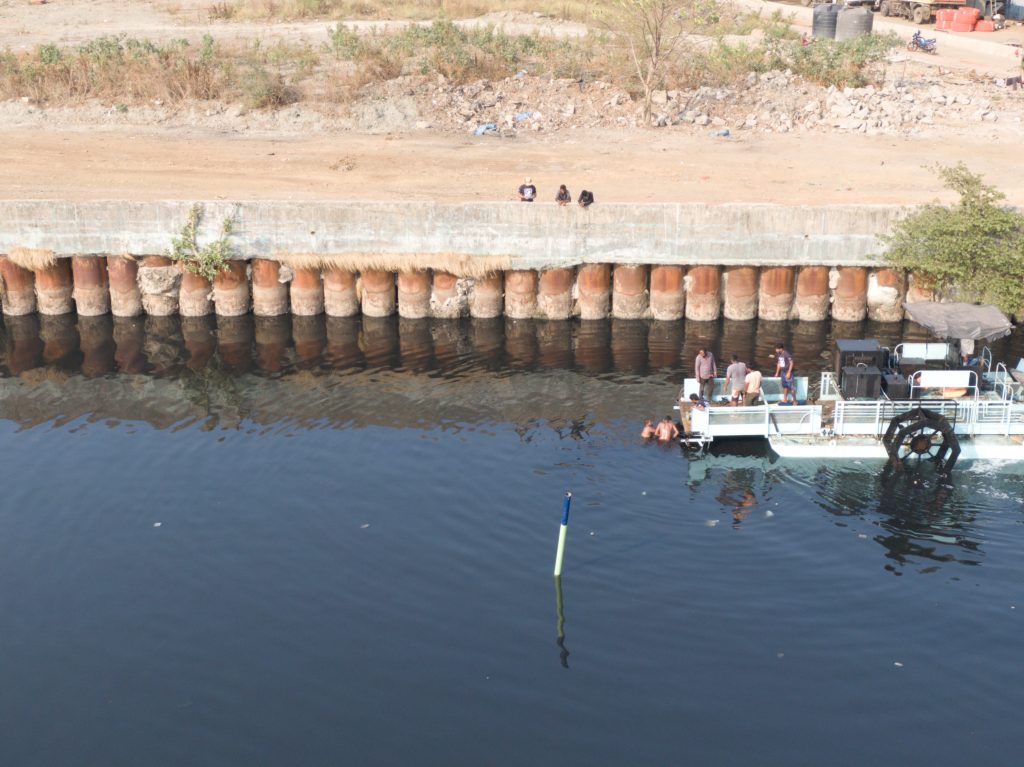
Earth5R Working on River Clean up Project at Mithi River, Mumbai
Human Impact on Water Bodies
Human activities are impacting these waterbodies by increasing solid waste, sewage accumulation, and pollution.
Anthropogenic Activities, like industrial pollution and sewage discharge, harm water bodies, impacting their health and sustainability. Hence there is a need for cleanup projects.
Understanding the Key Human Impacts on Water Bodies in India
Industrial effluents are a major contributor to water pollution in India. The Central Pollution Control Board (CPCB) reports that industries release over 88,000 MLD of wastewater daily, severely degrading water quality.
Excessive use of fertilizers and pesticides in agriculture leads to nutrient runoff into water bodies, which in turn causes eutrophication.
According to the Indian Agricultural Research Institute (IARI), agricultural runoff contributes to around 50% of pollution in India’s rivers. Specifically, this highlights a major environmental issue that needs addressing.
The inadequate treatment of sewage is a significant issue in India. **According to** the Ministry of Jal Shakti, **approximately** 70% of urban sewage in India **is discharged untreated** into water bodies, **posing significant environmental risks**.Consequently, this practice contaminates the water with pathogens and organic pollutants.
Solid Waste Pollution solved by cleanup projects:
- According to the Ministry of Environment, Forest and Climate Change, India generates over 1.3 million tons of municipal solid waste daily.
- Only about 60% of generated municipal solid waste (MSW) is collected, with roughly 15% treated, leaving much untreated and polluting.
- Plastic waste constitutes approximately 60% of India’s total municipal solid waste, severely threatening the environment, particularly water bodies and marine ecosystems.
- Improper disposal of solid waste leads to clogged drains and waterways, causing flooding during monsoon seasons in many Indian cities.
- The inadequate waste management infrastructure leads to widespread littering and illegal dumping, exacerbating pollution levels in both urban and rural areas.
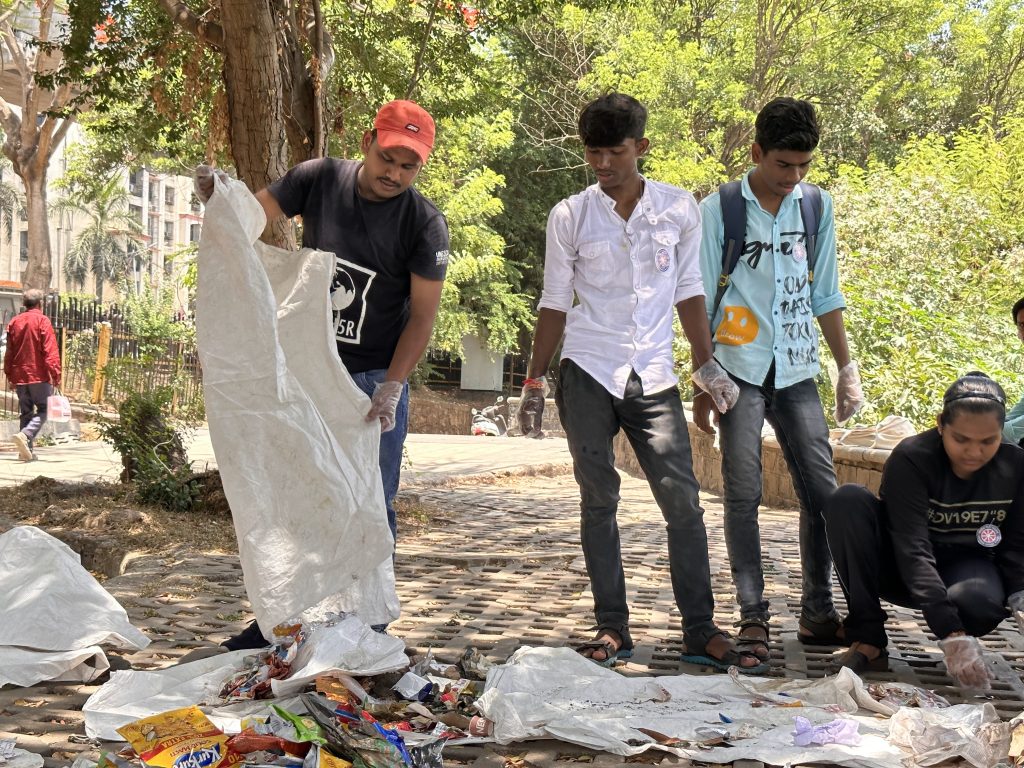
Earth5R’s Plastic Credit Initiative, Mumbai
Ganga River:
- The Ganga River, flowing through cities such as Kanpur, Varanasi, and Patna, suffers from solid waste pollution due to untreated sewage, industrial discharge, and urban waste dumping.
- Solid waste, including plastic bags, bottles, and other debris, accumulates along the banks of the Ganga. Consequently, this accumulation adversely affects water quality and aquatic biodiversity. Moreover, the presence of such waste exacerbates environmental degradation in the region.
- Various initiatives and cleanup projects under the National Mission for Clean Ganga (NMCG) aim to address solid waste pollution in the Ganga River basin, including waste management projects and riverfront development schemes.
Yamuna River:
- The Yamuna River, passing through cities like Delhi, Agra, and Mathura, faces severe solid waste pollution, primarily from urban waste, industrial effluents, and sewage discharge.
- Large quantities of plastic waste, along with other solid debris, are often found along the banks of the Yamuna, contributing to water pollution and environmental degradation.
- Efforts by local authorities and environmental organizations primarily focus on cleaning up the Yamuna River and simultaneously implementing waste management solutions to reduce solid waste pollution.
Sabarmati River:
- The Sabarmati River, flowing through cities such as Ahmedabad and Gandhinagar, experiences solid waste pollution due to industrial discharge, urban waste dumping, and agricultural runoff.
- Solid waste, including plastic waste and other debris, gradually accumulates along the banks of the Sabarmati, thereby posing environmental and aesthetic concerns.
- Cleanup Projects drives and awareness campaigns led by local governments and community groups aim to mitigate solid waste pollution in the Sabarmati River and restore its ecosystem. Specifically, these efforts focus on reducing pollution while promoting sustainable practices to ensure long-term environmental health.
Krishna River:
- The Krishna River, flowing through states like Maharashtra, Karnataka, and Andhra Pradesh, faces solid waste pollution, particularly in urban areas such as Pune, Sangli, and Vijayawada.
- Solid waste, including plastic bottles, wrappers, and other debris, is often found along the banks of the Krishna River, affecting its water quality and ecosystem.
- Efforts by local governments and environmental organizations are underway to address solid waste pollution in the Krishna River basin through cleanup Project drives and waste management initiatives.
Godavari River:
- The Godavari River, one of the largest rivers in India, is plagued by solid waste pollution, especially in cities like Nashik, Nanded, and Rajahmundry, through which it flows.
- Urbanization and industrialization along the banks of the Godavari have led to increased solid waste generation and improper disposal practices. Consequently, these activities have contributed to higher pollution levels in the river.
- Various government and non-governmental initiatives are working towards reducing solid waste pollution in the Godavari River. For instance, community clean-up efforts and awareness campaigns are among these initiatives. Additionally, these combined actions aim to address the issue from multiple angles.
Kaveri River:
- The Kaveri River, flowing through Karnataka and Tamil Nadu, experiences solid waste pollution in cities such as Bangalore, Mysore, and Salem.
- Solid waste, including plastic bags, wrappers, and other debris, accumulates along the banks of the Kaveri, impacting water quality and aquatic life.
- Sustainable waste management practices and river clean-up initiatives are being implemented to address solid waste pollution in the Kaveri River basin and protect its ecosystem.
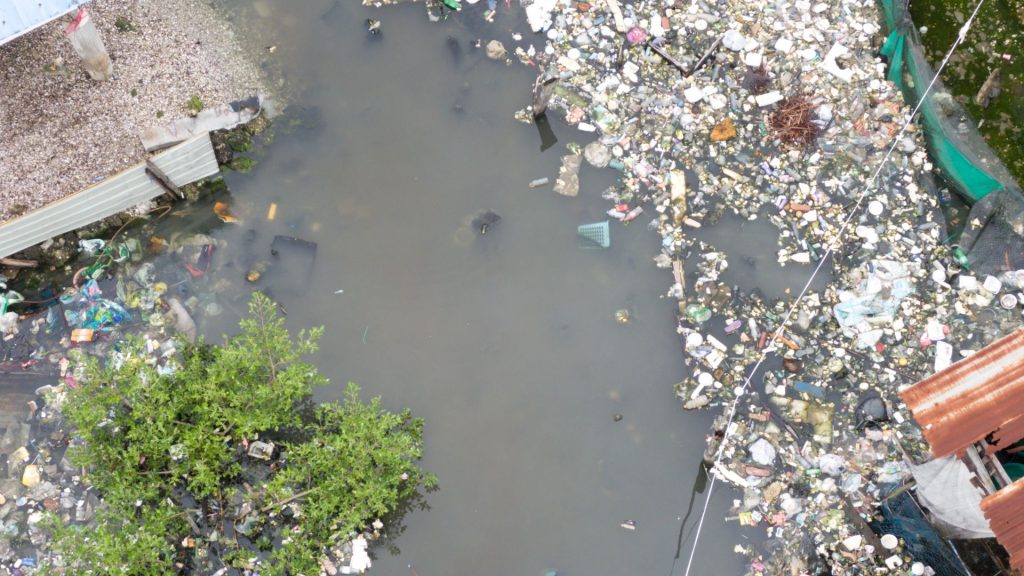
Solid Waste in Mekong River, Thailand
Earth5R’s River Cleanup Programs
Earth5R is actively engaged in such activities, & plays a crucial role in raising awareness, implementing practical solutions, and promote community involvement to protect and preserve our water ecosystems.
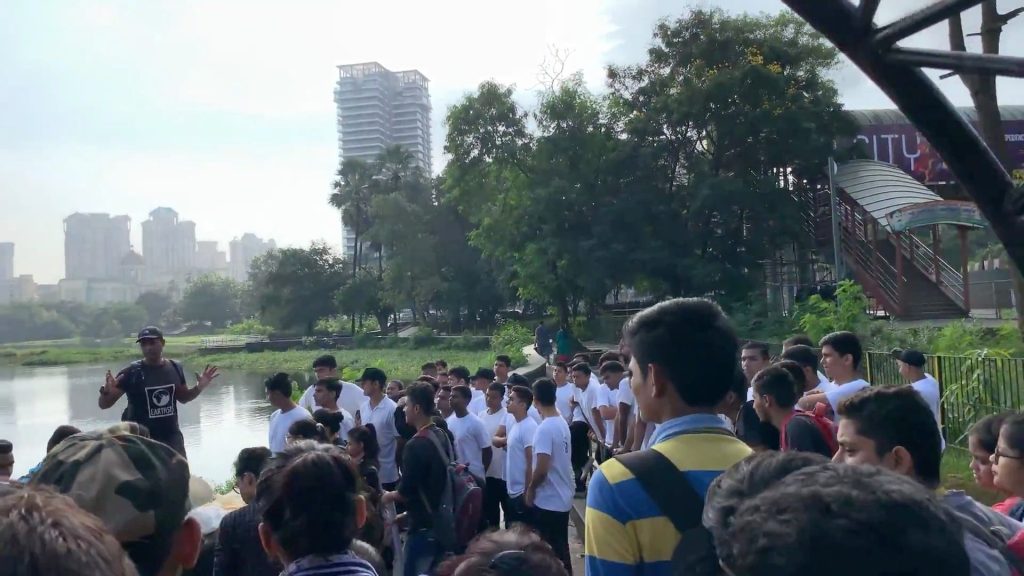
Earth5R’s Environmental Awareness Program, Mumbai
By 2025, an estimated around 5 billion people out of a total population of around 8 billion will be living in areas of water stress.
One of the major environmental issues affecting humanity is the increasing worldwide contamination of freshwater systems as a consequence of industrial and chemical compound materials being emptied into their runways, majorly in form of micro-pollutants.
Earth5R is continuously involved in the cleanup activities, & is also taking initiatives in the awareness campaigns amongst citizens about the significance of waste segregation and the importance of river, lakes and beach cleanups.
Human activity affects weather, climate, and the environment. Activities such as farming, clearing forests, building roads, and mining can put too much soil and particulate matter in rivers.
Cleanup projects: Waterbodies Restoration Programs
There are various restoration programs and techniques for waterbodies, that include physical, chemical & biological methods.
Biological treatment uses natural processes or organisms to clean water, while lake drawdown lowers water levels to clean sediment.
Lake bottom sealing involves covering sediment to stop pollution, and flood control uses structures to manage floods. Dredging removes pollutants, aeration adds oxygen, and buffer zones filter runoff.
These restoration activities will not only enhance the water quality, ensuring a reliable and sustainable source of clean water for various purposes, including irrigation, and ecosystem health but also create livelihood opportunities for the communities who live near rivers.
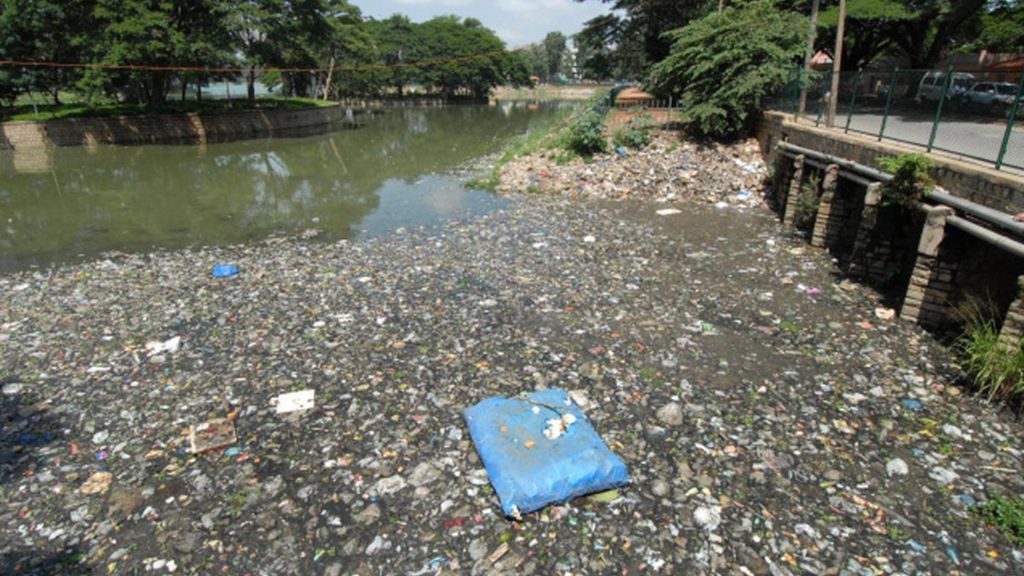
Solid Waste at Agara Lake in Bangalore, India
Earth5R is implementing various initiatives to enhance waste management systems, including strategically placing bins, beautifying areas, establishing jogging tracks, installing solar-powered lamps, and conducting cleanup programs.
The benefits of this restoration include goods such as clean water for drinking, ecosystem services such as water purification and flood regulation which are crucial for human survival and also important in consideration of environment.
Earth5R’s Clean up Programs
Earth5R has been making efforts and impactful cleanup initiatives across Mumbai, Pune, Goa, Chennai, Hawaii & Malta.
Juhu beach cleanup CSR program by Earth5R
Earth5R’s Mithi River Cleanup Program in Mumbai was Funded by UN, in partnership with MMRDA, River recycling, VTT & Huhtamaki.
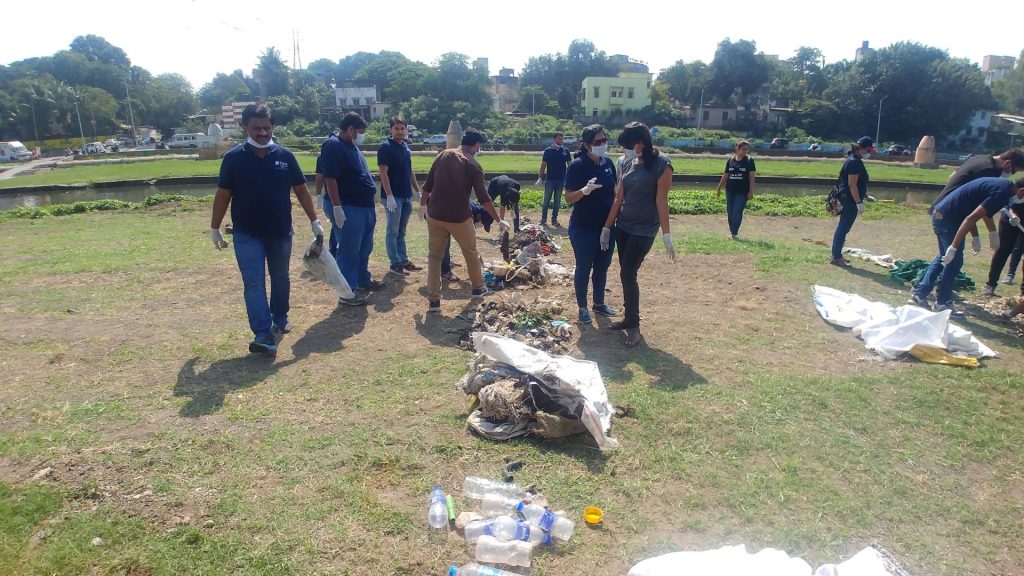
Earth5R’s River Cleanup Program, Mula Mutha river. Pune
In 2018, Earth5R took up the task of cleaning Powai lake, a major contributor to the Mithi river.
Every year, visitors and locals dump tons of non-biodegradable waste, such as plastic wrappers, bottles, religious items, and other trash, into Powai Lake.
During the clean-up project, the Earth5R team and volunteers removed over a ton of plastic waste, recycling most of it afterward.
This trend of dumping wastes into the water continues into the Mithi river as it flows down to the Arabian sea.
Every day, Mumbai dumps 80 to 110 metric tons of plastic waste, primarily single-use plastic, into its drains and water channels.
Mumbai Beach Cleanup project By Lufthansa And Earth5R
Earth5R, in collaboration with the Lufthansa Group, recently organized a beach cleanup initiative that gained support from volunteers of all age groups, united in their commitment to effecting positive change within their local community.
This partnership serves as a testament to Earth5R’s mission as a global environmental organization dedicated to sustainable communities by spreading environmental best practices and Promoting active engagement in environmental management initiatives.
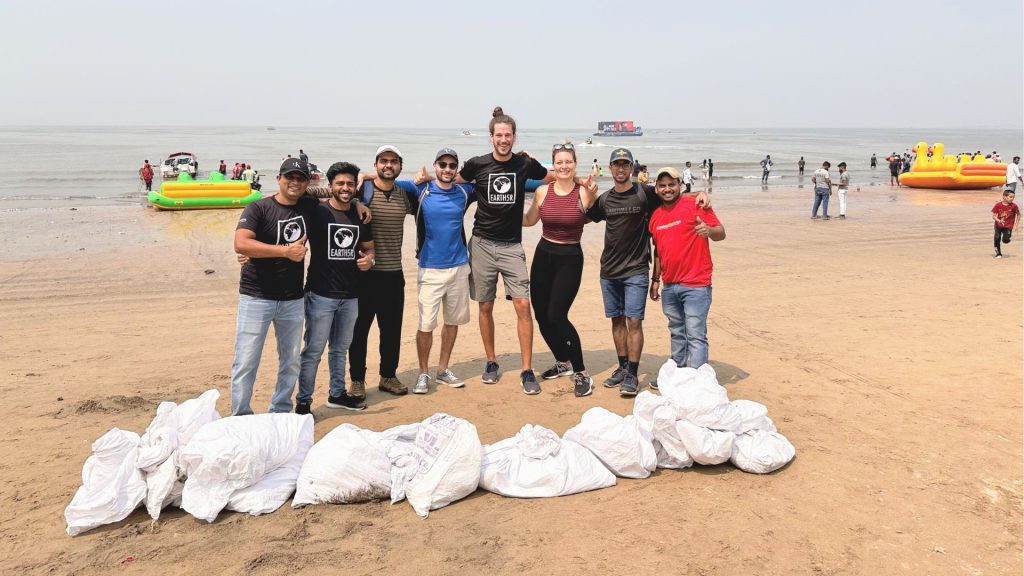
Beach Cleanup Program by Lufthansa & Earth5R, Mumbai
Plastic pollution remains a pressing environmental concern, particularly in coastal regions where marine ecosystems are tender.
In response to this urgent challenge, Earth5R consistently organizes beach cleanup programs for raising awareness and encouraging people to take action.
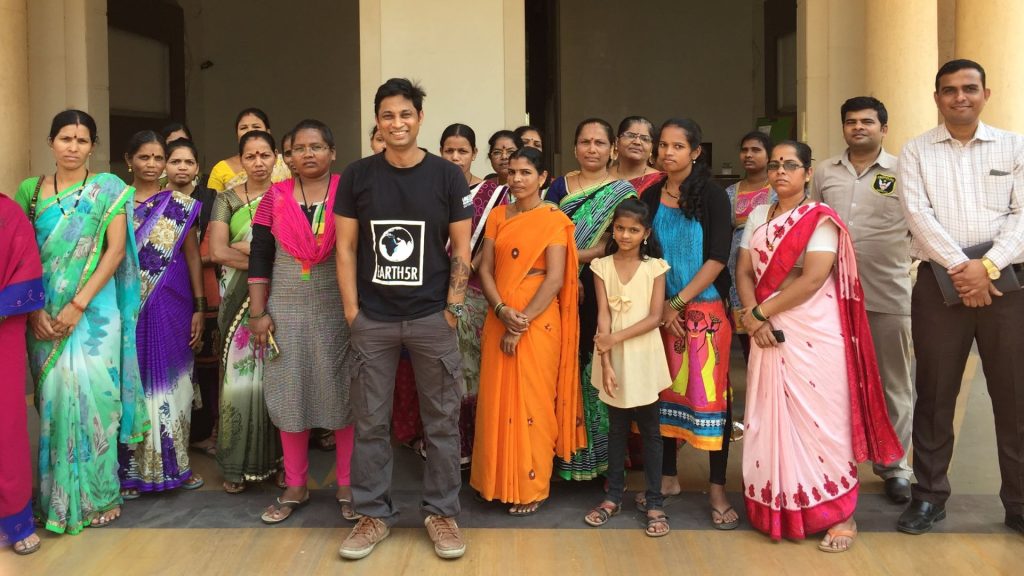
Earth5R’s Awareness Program on Waste Management for House Helpers & Housekeepers, Mumbai
Earth5R has a big group of people all over India who join hands for cleanup drives.
They get permission from local authorities and gather volunteers and resources for these cleanups. They focus on finding problems and locations before starting any project.
Each team has a leader and they work closely with recyclers and ragpickers to recycle waste, making their efforts more effective.
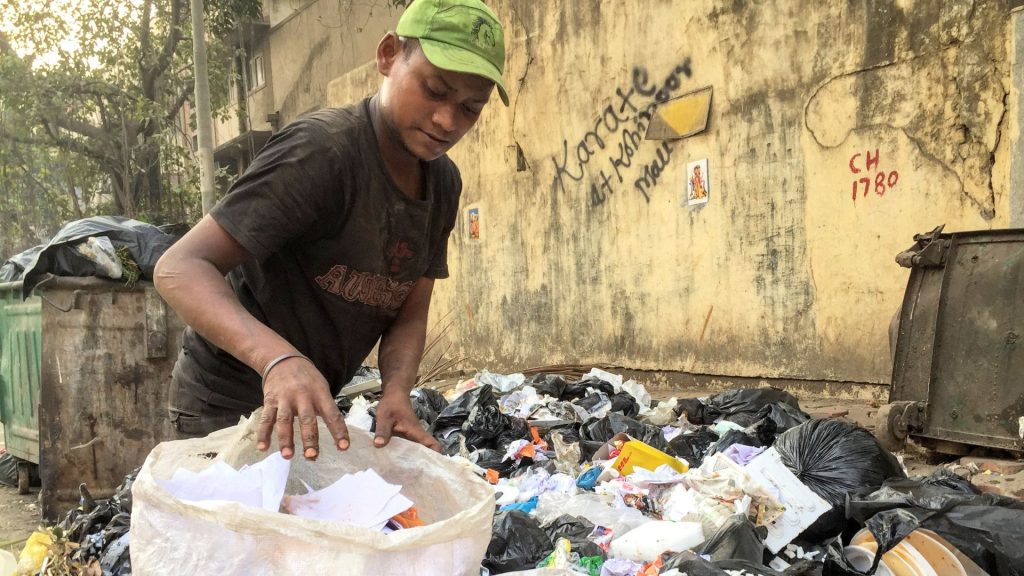
Earth5R Team Working With Ragpickers & Recyclers for Plastic Credit based Circular Economy CSR Project
Mula Mutha River Cleanup, Pune
Earth5R conducted a Mula Mutha River Cleanup and Citizens Awareness program in Pune.
During the cleanup, we found various types of waste, including a significant amount of snack packets and cigarette butts.
Cigarette butts are a major form of litter, with an estimated 4.5 trillion discarded worldwide annually.
Made of nonbiodegradable plastic, they can take years to decompose and contain toxic chemicals like cadmium and arsenic, posing serious threats to aquatic ecosystems.
Earth5R’s local team in Pune has been addressing the issue for the past two years and initiated a street campaign to raise awareness about the harmful impact of cigarette butt pollution.
Through citizen engagement and education, the organization aims to encourage small lifestyle changes and combat plastic pollution effectively.
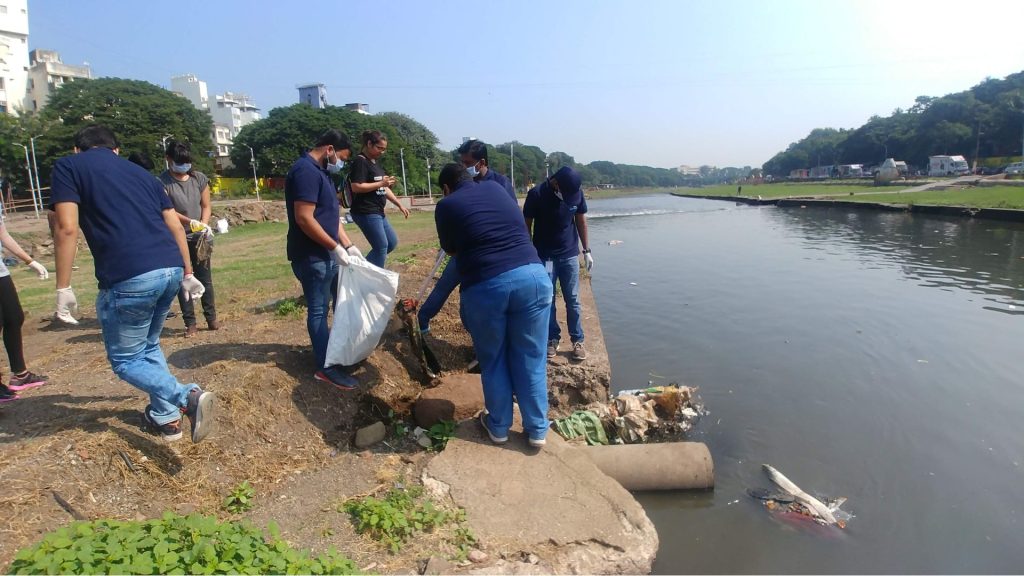
Mula Mutha River Cleanup by Earth5R, Pune
Bellandur Lake Cleanup At Bangalore
Earth5R’s ‘Lake of Fire’ initiative took on the challenge of cleaning up and studying the lake, uncovering the severe impact of rapid industrialization and urban expansion on its ecosystem.
The lake, once a thriving water body, has now become heavily polluted with toxic waste and sewage, due to the dumping of garbage by nearby residents and vendors.
This environmental crisis is not only a threat to the health and livelihoods of local communities but it shows the urgent need for decisive environmental action.
Earth5R’s advocacy for stricter regulations on industrial waste disposal, improved waste management practices, and the diversion of sewage to treatment plants aims for a transformative environmental movement in Bengaluru, paving the way for the restoration and preservation of Bellandur Lake.
Yeoor Lake Cleanup, Thane
The Yeoor Lake in Thane, a water body heavily polluted with garbage and waste.
The team, led by founder Saurabh Gupta and including members like Khushbu Chotalia and Sagar Kulkarni, worked tirelessly to clear the lake of debris, ranging from puja waste to car seats.
Their efforts not only improved water quality but also educated locals about the importance of waste management, preventing further pollution.
Children and residents pledged to protect the lake, highlighting the significance of community involvement in conserving water bodies.
Cleanup projects: Awareness On The Ganga River Pollution By Earth5R Varanasi
Earth5R in Varanasi, led by Rishika Jaiswal, took a proactive step to address the increasing pollution of the sacred Ganga River.
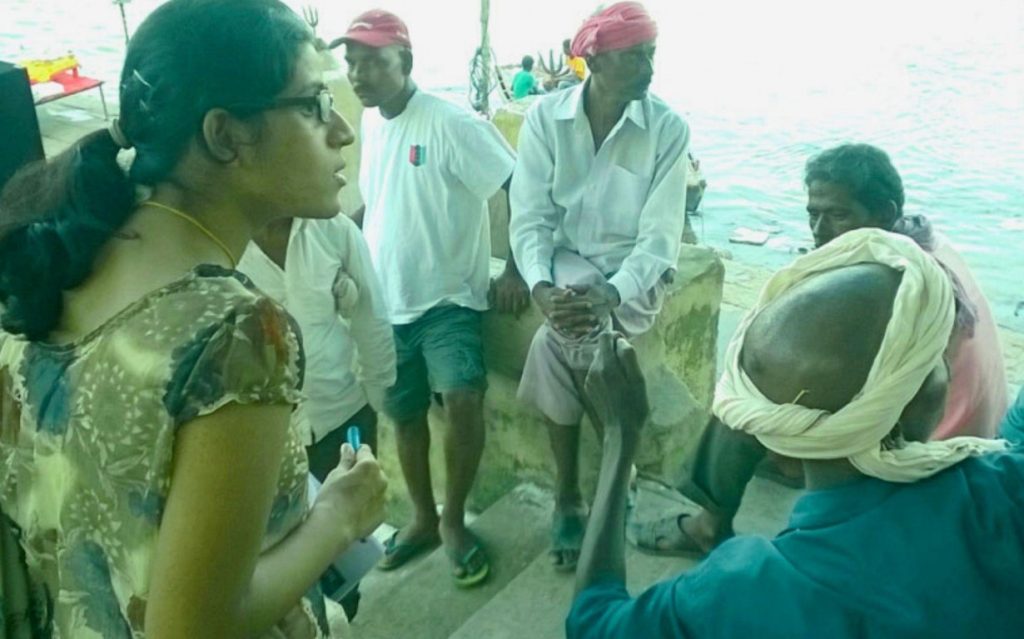
Earht5R’s Awareness Program on River Pollution, Varanasi
Conducting an awareness program at Assi ghat, Varanasi, Rishika educated the community about the detrimental effects of river pollution and advocated for sustainable practices.
She emphasized the importance of minimizing waste by discouraging the use of soap and detergent in the river and urged people to refrain from littering plastic, garlands, wood, and other garbage.
Through such conscious efforts, Earth5R aims to contribute to the revival of the Ganges and raise awareness about the urgent need for environmental responsibility in order to protect our precious water resources. In addition, these efforts underscore our commitment to sustainable practices and community engagement.
Earth5R has started many other projects to help with environmental problems.
Earth5R’s Collaboration with National Geographic for cleanup projects
Here’s the revised version with transition words:
The Earth5R team collaborated with National Geographic to consult on reducing plastic pollution in the Ganga River.
Subsequently, they participated in a national event in Delhi alongside various experts.
The impact sector acknowledged Earth5R’s involvement in recognition of their efforts for civil consultation.
Moreover, their strategies focused on mobilizing communities along the Ganga River belt from the Himalayas to West Bengal.
Specifically, these strategies included assisting local communities in generating livelihoods and conducting personal training sessions on waste management.
Consequently, they stressed proper waste segregation to keep riverbanks clean and prevent littering, which harms biodiversity as litter often contaminates rivers.
Earth5R Partnership
Companies keen on partnering with Earth5R for river, beach, or lake cleanups can contact us at community@earth5r.org for collaboration opportunities.
Please give us ample time to design events & projects as per requirements .
At Earth5R, we support you throughout the entire process, including planning, community building, volunteer selection, cleanup projects execution, and management.
We also handle event reporting and management on our app and social media platforms.
We help companies improve their ESG ranking and portfolio by making a real impact through participation in national environmental programs.


